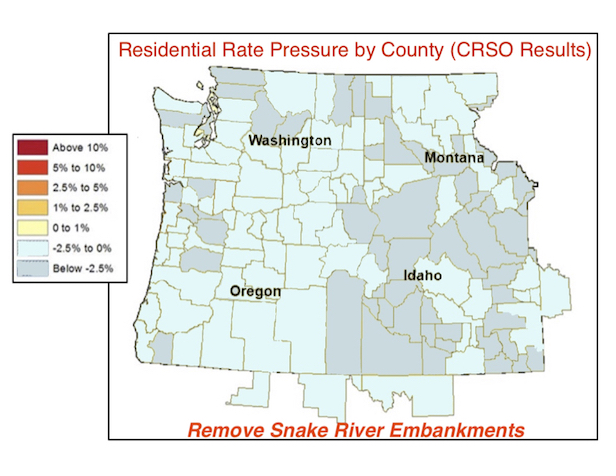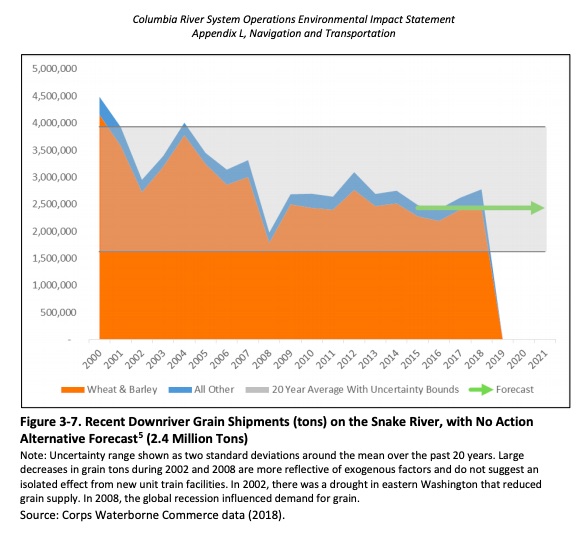forum
library
tutorial
contact

Dam Breaching Proposal
is a Terrible Idea
by Bryan Searle
Capital Press, April 5, 2021
|
the film forum library tutorial contact |

|
Dam Breaching Proposal
by Bryan Searle
|
Almost half of the wheat grown in Idaho is moved by barge down the Columbia-Snake River system to Portland.
 Make no mistake about it, a proposal by Rep. Mike Simpson, R-Idaho, that would result in the removal of the four lower Snake River dams would dramatically and negatively impact Idaho agriculture and the entire state.
Make no mistake about it, a proposal by Rep. Mike Simpson, R-Idaho, that would result in the removal of the four lower Snake River dams would dramatically and negatively impact Idaho agriculture and the entire state.
It would also result in higher power costs for everyone in the Pacific Northwest and forever alter, in a bad way, the region's way of life.
Idaho Farm Bureau Federation members -- virtually everyone involved in agriculture in the state for that matter -- were disheartened to hear that a member of the state's congressional delegation had created a proposal that would result in those dams being breached.
Many people, including myself, were dismayed when they first heard about Simpson's $33.5 billion proposal, which seeks to improve populations of endangered salmon by removing the four hydroelectric dams.
Let me be very clear: Our opposition is not directed toward Representative Simpson, who has accomplished some good things for Idaho during his time in office.
Our opposition is squarely placed on the congressman's proposal, which we believe would be bad for agriculture, bad for the environment and bad for power rates, while holding no guarantee that it would improve populations of endangered salmon.
Let me also be clear on this: Farm Bureau supports improving salmon populations.
IFBF policy, which was developed by the organization's members at the grassroots level, supports several salmon-recovery alternatives, including privatizing salmon fisheries for stronger fish; controlling predators of salmon, regulating harvest of off-shore and in-stream fish, and using new hydroelectric turbine technologies to reduce fish hazards.
But removal of the dams is a non-starter for our organization, which represents more than 80,000 member-families in Idaho, including at least 11,000 people who are actively engaged in agriculture.
IFBF policy, which was developed by Farm Bureau members at the grassroots level, supports "the continued existence and current usage of all dams on the Columbia and Snake Rivers" and opposes "any efforts to destroy or decrease production of those dams."
The lower four dams on the Snake River supply a significant amount of cheap and environmentally friendly hydroelectric power to the region.
They are also a critical part of a system on the Columbia and Snake rivers that allows wheat farmers, as well as producers of many other commodities, to export their product to the world. The river, combined with its system of dams and locks, provides for the environmentally friendly ability to transport wheat, pulse and other crops to Portland by barge so they can be shipped across the world. Removing the dams would make the Columbia-Snake River system unnavigable for barges that move wheat, barley and other products to Portland for export. Removing the dams would have a devastating impact on Idaho's wheat farmers, who grow that crop in 42 of the state's 44 counties. Idaho wheat growers brought in $525 million in farm-gate receipts in 2020 and wheat is the state's No. 2 crop in that category.
Almost half of the wheat grown in Idaho is moved by barge down the Columbia-Snake River system to Portland.
 Barging is the most cost-effective and environmentally friendly way of getting wheat from Idaho to market and the Columbia-Snake system is the third largest grain export gateway in the world.
Barging is the most cost-effective and environmentally friendly way of getting wheat from Idaho to market and the Columbia-Snake system is the third largest grain export gateway in the world.
According to a study commissioned by the Pacific Northwest Waterways Association, a nonprofit group that represents a diverse coalition of 135 groups in Idaho, Washington and Oregon, removing the dams would significantly increase diesel fuel consumption because barges would be replaced by less efficient truck and rail shipment.
The study found that shifting transportation of commodities from barges to truck and rail would increase carbon and other emissions by more than 1.3 million tons per year. That's the same as adding 181,889 passenger cars or 90,365 homes.
According to the PNWA study, it would take about 35,000 rail cars or 135,000 semi-trucks to move all the cargo that is barged on the Snake River.
People in Idaho and the PNW enjoy some of the very cheapest power rates in the nation because of the electricity produced by those four dams and others on the Columbia-Snake system.
Removing those hydroelectric dams would result in power rates in the region increasing dramatically.
So, removing the dams would not only be bad for agriculture and bad for power rates, it would also be bad for the environment.
Simpson's proposal would create a $33.5 billion "Columbia Basin Fund" to help transition economies and sectors negatively impacted by dam removal.
The plan attempts to place a price tag on our way of life in Idaho and the Pacific Northwest and it also attempts to compensate sectors, such as agriculture, that will be impacted by dam removal.
We believe attempting to place a price tag on our way of life is not possible, nor proper, and besides, farmers would rather make their living from the market and not be "compensated" by the government.
IFBF members believe that the congressman's proposal would have a major negative impact on the region's economy and way of life, while making no assurances that salmon populations would improve.
We're not the only ones. The list of people and groups opposed to the plan is growing seemingly by the day. Every other member of Idaho's congressional delegation, as well as our governor, is on record since the proposal came out as opposing dam breaching.
In addition, groups representing agriculture and other industries in Idaho have come out in opposition to the plan, as have lots of county commissioners and other elected officials. A Senate Joint Memorial opposing dam breaching is sailing through the Idaho Legislature.
We sincerely hope Congressman Simpson hears Idahoans' collective thinking on his proposal and reconsiders and scraps it, for the benefit of the entire state.
learn more on topics covered in the film
see the video
read the script
learn the songs
discussion forum
